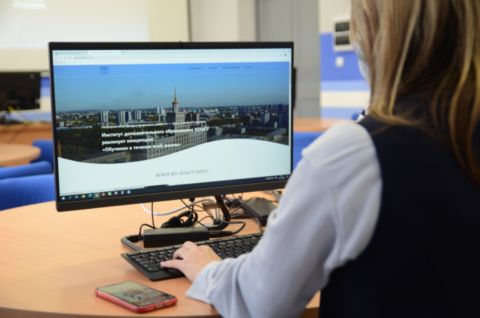The International Office of South Ural State University and the Russian Centre for Science and Culture of Mongolia organized and implemented a joint educational project. For two months the citizens of Mongolia, dreaming of studying in Russia, have been learning the Russian language. The training took place at the Department of Russian as a Foreign Language of the Institute of Linguistics and International Communications under the additional educational program Russian as a Foreign Language. The course was held in an online format.
“This format is no longer new for us, we have successfully taught Russian language from the beginning to international students in an online format. The course is intensive, for two months the students have been engaged in daily,” says a lecturer Alina Kurbanova.
Alina has taught the Russian language to foreigners together with her colleague Dina Valeeva. The main task of the teachers is that the students have mastered the basic grammar of the A1 level, and are able to tell about themselves, as well as about the specialty they plan to enrol in.
The idea of the project was born after the participation of the staff of the SUSU International Office in the “Russian Exhibition on Education”, which was held in Mongolia in an online format. At the exhibition, the representatives of SUSU told the applicants about the educational programs of the university, as well as the opportunities offered by studying at South Ural State University, after which there was a request for the Russian language course from applicants from Mongolia. The educational course completed on March 5.
“Upon the completion of the course, the students successfully passed the A1 level exam in Russian and received certificates confirming the completion of the training,” commented Alina Kurbanova.
A total of 11 people completed the course. In the process of training, they were repeatedly presented with the SUSU educational programs. Medical, engineering fields of study, as well as jurisprudence, economics and IT were of great interest among the students.
“For two months my Russian has improved a lot. The lessons are well structured, the teachers are good. The Russian language is very difficult, I continue to study it. I like the way Russian is spoken and I want to study in Russia. I plan to enrol next year. If everything works out, then I will definitely come to study with my teachers Kurbanova Alina and Valeeva Dina. I am very grateful to SUSU for the opportunity to undergo this training,” says Monkh-Od Monkhgerel, a participant of the educational program from Mongolia.
The educational event was held in cooperation with the Russian Centre for Science and Culture of Mongolia. This organization holds educational exhibitions, and is also engaged in the selection of applicants for study in Russia, including according to the quota allocated by the Russian Federation. This year, 510 quota places have been allocated for Mongolia. The executive director of the Mongolian Association of Graduates of Soviet/ Russian Educational Institutions Ts. Shurenchimeg says: “At present in Mongolia, Russian is taught only from 7th to 9th grade for 2 hours a week, therefore, before the start of the courses, the level of knowledge of the Russian language is practically that of a starter.”
“Our joint project with SUSU turned out to be in demand, and most importantly, successful and fruitful. First of all, the courses were attended by Mongolian applicants who planned to apply for quotas for higher education in one of the Russian universities. That was the main motivation for learning the Russian language. Despite the short training period, the goal of mastering the A1 level has been largely achieved, and we believe that this is a good result. Learning a foreign language largely depends on the teacher. In our case, the teacher is not only a native speaker, but also a representative of a Russian university, and this helps many students to acquire speaking skills in such a short period of time, to master the basics of phonetics, listening and vocabulary at the same time,” notes Ts. Shurenchimeg. “Very experienced and qualified SUSU teachers, who are fluent in the methodology of teaching Russian to foreigners, help to achieve high results for applicants from Mongolia. Many course graduates are interested in the next enrolment. We express our gratitude to all the teachers of the Russian language and the SUSU staff, who organized and taught classes in our courses.”




